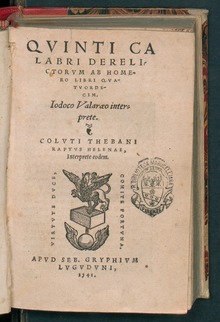
The Posthomerica (‹See Tfd›Greek: τὰ μεθ᾿ Ὅμηρον, translit. tà meth᾿ Hómēron; lit. "Things After Homer")[1] is an epic poem in Greek hexameter verse by Quintus of Smyrna. Probably written in the 3rd century AD, it tells the story of the Trojan War, between the death of Hector and the fall of Ilium (Troy).[2] The poem is an abridgement of the events described in the epic poems Aethiopis and Iliou Persis by Arctinus of Miletus, and the Little Iliad by Lesches, all now-lost poems of the Epic Cycle.
The first four books, covering the same ground as the Aethiopis, describe the doughty deeds and deaths of Penthesileia the Amazon, of Memnon, son of the Morning, and of Achilles; and the funeral games in honour of Achilles. Books five through twelve, covering the same ground as the Little Iliad, span from the contest between Ajax and Odysseus for the arms of Achilles, the death of Ajax by suicide after his loss, the exploits of Neoptolemus, Eurypylus and Deiphobus, the deaths of Paris and Oenone, to the building of the wooden horse. The remaining books, covering the same ground as Iliou Persis, relate the capture of Troy by means of the wooden horse, the sacrifice of Polyxena at the grave of Achilles, the departure of the Greeks, and their dispersal by the storm.
- ^ Renker, S. (2020:13). A Commentary on Quintus of Smyrna, Posthomerica 13. Germany: University of Bamberg Press.
- ^ Baumbach, M., Bär, S. (2007). Quintus Smyrnaeus: Transforming Homer in Second Sophistic Epic. Berlin: Walter de Gruyter GmbH & Co. KG. pp. 7–8. ISBN 978-3-11-019577-4.
{{cite book}}: CS1 maint: multiple names: authors list (link)